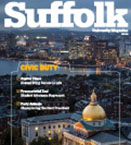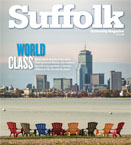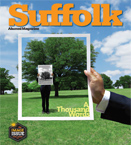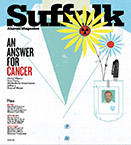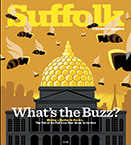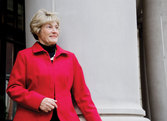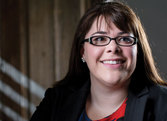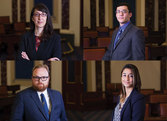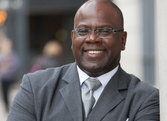Conversation Starter
Eyeing the Finish Line
With a long-deferred retirement in sight, legendary athletic director James "Coach" Nelson looks back on "four glorious decades" at Suffolk.
By Renee Graham
This August, James Nelson will step down as Suffolk University’s athletic director, a post he has held since 1975. “Coach Nelson,” as he is affectionately known around campus, came to Suffolk in 1966 as its assistant AD and assistant men’s basketball coach, and has been one of the nation’s most honored collegiate athletic executives. The National Association of Collegiate Directors of Athletics recently named him NCAA Division III Athletic Director of the Year for the Northeast Region. An inaugural member of Suffolk’s Hall of Fame, Nelson has also been inducted into the New England Basketball Hall of Fame.
After 46 years at Suffolk, why are you retiring now?
I had spoken to two previous presidents [David Sargent JD ’54, LLD ’78 and Barry Brown] as I became eligible for Social Security and both of them, interestingly enough, said they would not hear of it. It was said that if I made an appointment to come speak with them about retirement, their secretaries would not schedule it and I would not be able to step in the office. So I took that as a compliment. When President McCarthy came on board, I had a conversation with him, and my own thoughts were it would not be appropriate for me to leave with him just coming on board. I wanted to give at least one full year to work under his leadership, and I’m pleased that I’ve been able to do that.
What first brought you to Suffolk in 1966?
I was familiar with Suffolk from my high school days because I grew up in Cambridge, and the Suffolk team since 1957 played their home basketball games at the Cambridge Y[MCA]. I was a member of the Cambridge Y, and I would practice with the Suffolk team to get a workout, and I became friendly with my predecessor, Charlie Law. Back in my high school years, Charlie attempted to recruit me to go to Suffolk, but I elected to accept a basketball scholarship to Boston College. As I say so often, I had four wonderful years at Boston College, but I’ve had four glorious decades at Suffolk University. Many people think Suffolk is my alma mater, and in many regards it is, both from a professional and personal standpoint.
When I was graduating from Boston College, a player on Mr. Law’s team mentioned that they were going to hire a second full-time person. I visited Charlie at his home on Cape Cod during the summer. I had an interview with then- Dean of Students D. Bradley Sullivan, and I had an interview with the president at that time, John E. Fenton [JD ’24]. I’m not so sure things work quite this way any more: I went into his office and he said, “Tell me a little bit about yourself.” I told him I graduated from Boston College, and that Bob Cousy, the legendary player for the Boston Celtics, was my college basketball coach. Judge Fenton said, “I love Bob Cousy, I’m a Holy Cross grad as well.” Then I said that Monsignor Fallon is my parish monsignor, and [Fenton] said, “A classmate of mine at Holy Cross.” He looked at [former Suffolk Vice President and Treasurer] Frank Flannery [MBA ’64] and said, “Young Nelson seems to have all the credentials that we need.” I’m not so sure things happen that way any more, but I’m pleased that they did at that time.
Is there one moment, one achievement, that best encapsulates your career at Suffolk?
It’s both the low point and the high point in my life at Suffolk University—the 1996 quadriplegic accident of student ice hockey player John Gilpatrick [BS ’00 , JD ’06]. We played our ice hockey games at Boston University [in the same arena where BU hockey player Travis Roy was paralyzed during a game a few months earlier]. In a game against Stonehill College, John was coming back on defense and there was a collision in front of a goal. The back of his head hit the crossbar, and he went down. I kept saying to myself, “He’s going to get up, he’s going to get up,” but he never did. He became a quadriplegic.
To the University’s credit, he came back with his wheelchair and guide dog named Ice, and I pushed him across the stage when he got his undergraduate degree. He was admitted to our Law School. Four years after the incident, his mother called and said John wanted to see me. My office desk overlooks Cambridge Street, with my back to the door. There was a knock on the door, and John said, “Coach,” and he was standing there. And he walked into my arms. He went on to get his law degree. If you saw John now, you would never know what happened to him. He even came back as an assistant hockey coach for a year. As I said, it was the low point and high point all wrapped up in one individual.
So after 46 years at Suffolk, what comes next?
Well, I’ll be here until August to help with the transition. I want to make sure that whoever is my successor gets everything they need. Sometimes it’s hard to think of what comes next because each day is an incredibly exhilarating and active one. I’m thankful for having been blessed with good health. It’s my hope—and I have spoken to [College of Arts & Sciences] Dean [Kenneth] Greenberg—to continue my course that I teach on the history of sport and the history of the Olympic games. I teach that in the fall, and it’s the history of football, soccer, and the Olympic games, and in the spring, it’s the history of basketball, baseball, and the [Boston] Marathon. I’ll also be adding a segment on the historic athletic statues of Boston, Massachusetts and the New England area. Maybe, in that regard, I’ll reach 50 years here.
